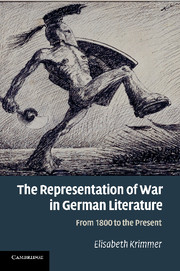Book contents
6 - War and myth: Jünger
Published online by Cambridge University Press: 06 July 2010
Summary
Few authors have incited as much controversy as Ernst Jünger. From his early journalism in the Weimar Republic to the Goethe Prize in 1982 up until his hundredth birthday on March 25, 1995, when he received visits by then German Chancellor Helmut Kohl and former French President François Mitterrand, Jünger kept the feuilletons busy. Repeatedly, Jünger was branded as an intellectual precursor of the Nazis. In a letter to Agnes E. Meyer, dated November 4, 1945, Thomas Mann called him “ein geistiger Wegbereiter und eiskalter Wollüstling der Barbarei” (an intellectual trailblazer and ice cold voluptuary of barbarism), while Helmut Heissenbüttel saw in Jünger the “Goethe der CDU.” Others, referring to his novel Auf den Marmorklippen (On the Marble Cliffs, 1939), see in him a representative of Germany's inner emigration, if not outright opposition to National Socialism. Decker calls him an “Aufklärer über die Illusionen der Aufklärung” (one who enlightens about the illusions of the enlightenment). Jünger is a recipient of the Goethe and Schiller Prize as well as a favorite with neo-Nazi groups. Botho Strauß went so far as to identify Jünger as the most important German author of the post-Second World War period.
Jünger was actively engaged in frontline fighting during the entire First World War, was wounded thirteen times, and awarded the Pour le Mérite, the highest military honor of the Wilhelmine empire. From 1920 to 1922, Jünger worked for the Reichswehrministerium (ministry of defense) in Berlin, drafting tactical manuals and guidelines for conduct in battle.
- Type
- Chapter
- Information
- The Representation of War in German LiteratureFrom 1800 to the Present, pp. 71 - 87Publisher: Cambridge University PressPrint publication year: 2010



